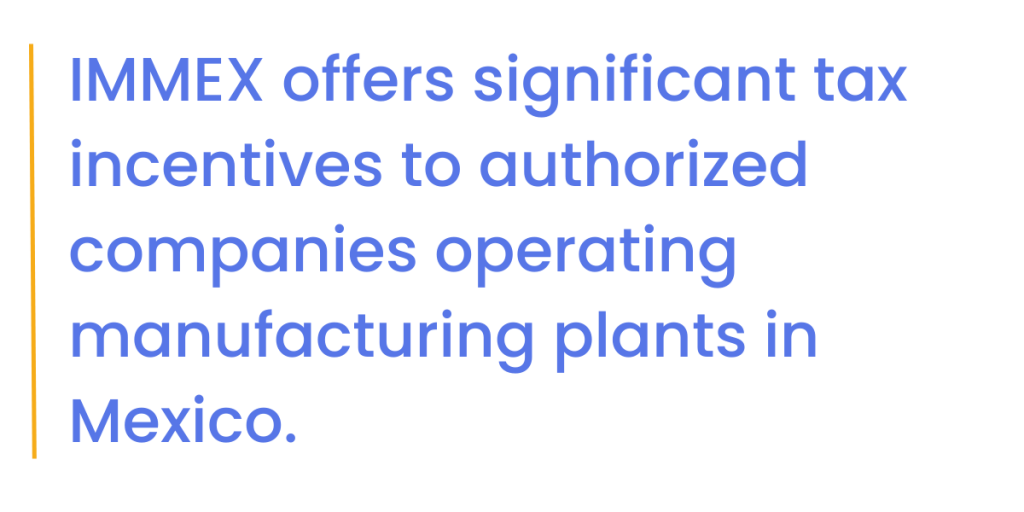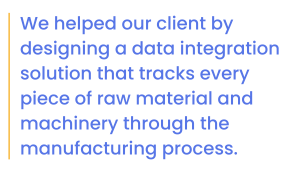The IMMEX program was created in 1965 by the Mexican government to increase foreign manufacturing investments and export activities in the country, specifically on the US-Mexican border. Since then, it has given Mexico the means to expand its economy through an influx of foreign capital and created more job opportunities for Mexican workers.
 IMMEX offers significant tax incentives to authorized companies operating manufacturing plants in Mexico, who can then also tap into the low-cost labor and production the country offers. However, the program’s stringent data tracking and reporting requirements make it challenging for foreign manufacturers to comply with all the program’s regulations if they don’t have robust data and reporting programs. For manufacturers that do, IMMEX can reduce import and export taxes by millions and provide a new way to produce goods efficiently and economically.
IMMEX offers significant tax incentives to authorized companies operating manufacturing plants in Mexico, who can then also tap into the low-cost labor and production the country offers. However, the program’s stringent data tracking and reporting requirements make it challenging for foreign manufacturers to comply with all the program’s regulations if they don’t have robust data and reporting programs. For manufacturers that do, IMMEX can reduce import and export taxes by millions and provide a new way to produce goods efficiently and economically.
What are the advantages of the IMMEX program for manufacturers?
IMMEX enables foreign manufacturers to save millions (if not billions) on taxes for raw goods and supplies imported into Mexico and finished goods exported to the US or Canada. With the IMMEX program, foreign manufacturers are exempt from paying the 16% value-added tax (VAT) added to raw materials and manufacturing equipment imported into Mexico. These imported goods are classified into two categories: “temporary” goods, which are the raw materials used to produce the finished manufactured products, and “definite” goods, which are the fixed assets like machinery that are imported for use in the manufacturing process.
Registered maquiladoras (also called “maquilas”), which are duty-free and tax-free factories, have 18 months to produce the finished goods from start to finish. If they manufacture the goods within this timeframe, they are also completely exempt from the taxes on exporting those finished goods out of Mexico to the US or Canada, which can result in billions of dollars in savings for major manufacturers.
In addition to the significant cost savings on imports and exports from the IMMEX program, some of the other advantages for foreign manufacturers include:
- A competitive advantage in the global market due to the faster product turnaround times
- Access to a highly skilled, less expensive workforce in Mexico
- Access to Mexico’s 30 ports of entry by land or by sea for imports and exports
- Additional tax advantages, including reduced income tax rates, accelerated depreciation of fixed assets, and reduced value-added tax on other imported goods
The reporting requirements for IMMEX also force companies to systematize and leverage their data in new ways, thereby providing the benefit of greater visibility into all areas of their manufacturing business. This includes:
- Supply chain visibility: IMMEX provides manufacturers with an in-depth view of their supply chains and logistics, enabling them to identify bottlenecks and optimize processes.
- Real-time manufacturing data: the data generated by IMMEX factories can be used to analyze trends and patterns, improve efficiency, monitor inventory levels, respond to disruptions, optimize schedules, and improve collaboration between manufacturers and suppliers.
What are the requirements of the IMMEX program?
IMMEX requires maquiladoras to maintain a strict automated inventory control system of foreign goods, proper documentation of all import and export activity, and meticulous accounting records. The automated control system that was developed to do this for IMMEX companies is commonly referred to as Annex 24.
Using Annex 24, companies must:
- Track the production of all goods, from the import of raw goods to the export of finished products, within an 18-month timeframe
- Demonstrate which imports are classified as “definite”
- Verify that the goods that are qualified as “temporary” have been exported or “returned”
- Provide evidence that at least 30% of all products manufactured are exported
- Track unfinished goods that are transferred between maquilas in Mexico within the 18-month timeframe
- Provide reports of all manufacturing activity that must be shared with the Mexican government and be readily available
- Generate reports indicating which materials were classified as waste or scrap
- Track and record goods that have been donated
- Demonstrate which imported goods have been imported from non-NAFTA countries and show that duties owed to Mexican customs for these items have been paid
- Track all imports, bills of materials, and exports
If a maquila has been operational for at least a year and the company’s Annex 24 has been well-maintained and compliant, then the company can apply for an Annex 30/31. Annex 30/31 is the value-added tax program that saves companies the import taxes on raw materials and other “temporary” goods that come into Mexico for manufacturing.
IMMEX solutions in practice
 As you can see, the requirements are complex, and getting the right data is not easy. With such precise controls and documentation needed, managing a maquiladora’s data for IMMEX compliance is complicated, but it’s well worth the effort in tax savings. The data required for Annex 24 and 31 is typically stored in an organization’s ERP system, with SAP being the most popular system used by manufacturers. In order to extract, format, and report on the data from SAP, organizations need a customized data management solution that integrates all data sources and makes it accessible to all parties for review and reporting. With the right data management partner, businesses can establish effective IMMEX reporting systems without making massive investments in their own custom solutions.
As you can see, the requirements are complex, and getting the right data is not easy. With such precise controls and documentation needed, managing a maquiladora’s data for IMMEX compliance is complicated, but it’s well worth the effort in tax savings. The data required for Annex 24 and 31 is typically stored in an organization’s ERP system, with SAP being the most popular system used by manufacturers. In order to extract, format, and report on the data from SAP, organizations need a customized data management solution that integrates all data sources and makes it accessible to all parties for review and reporting. With the right data management partner, businesses can establish effective IMMEX reporting systems without making massive investments in their own custom solutions.
One of Wavicle’s long-term partners is a global electronics manufacturer with factories in Mexico, and nearshoring their manufacturing to Mexico was a strategic priority. Part of this strategy was to maximize tax-saving benefits through IMMEX. They attempted to implement this program but failed because they did not have the right data solution to automate and comply with IMMEX.
 We helped our client by designing a data integration solution that tracks every piece of raw material and machinery through the manufacturing process so they can comply with Annex 24 and Annex 30/31. Our data pipelines ensure the data is accessible by all parties and consistent with what had been entered in their ERP System (SAP).
We helped our client by designing a data integration solution that tracks every piece of raw material and machinery through the manufacturing process so they can comply with Annex 24 and Annex 30/31. Our data pipelines ensure the data is accessible by all parties and consistent with what had been entered in their ERP System (SAP).
In addition to assuring IMMEX compliance, this solution consolidates critical manufacturing data that can fuel automated reports and data visualizations for the plant managers, who would otherwise only have access to manual reporting. Not only has our partnership with this manufacturer helped them achieve full IMMEX compliance – and save millions – it has also provided a foundation for data-driven decision-making within their local factories.
How Wavicle can help your company optimize the IMMEX program
The data captured for participation in the IMMEX program can be an invaluable resource for manufacturers, but it needs to be harnessed and reported correctly for businesses to receive the maximum benefit. While many manufacturers in Mexico may have also started building systems for IMMEX, the challenges of manually tracking materials and goods, generating sufficiently detailed reporting, and documenting compliance make it difficult to maximize savings without an automated solution.
Wavicle’s team of manufacturing data experts can help companies comply with IMMEX’s strict reporting requirements using data integration solutions that collect, format, track, and transmit the necessary data right from the organization’s ERP system, thereby cementing their eligibility for the program. Furthermore, our team is currently at work building an automated solution to amplify manufacturers’ tax savings under IMMEX with highly detailed, rapid tracking and reporting for eligible materials and finished goods.
Contact us today to find out how Wavicle can help you augment your manufacturing data management processes and stay tuned for updates on our automated solution to reap the benefits and savings of the IMMEX program.




